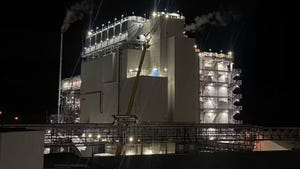Covestro to recycle saline wastewater discharged from PC production
Materials manufacturer Covestro (Leverkusen, Germany) has announced that it is testing an innovative and environmentally-friendly process for recycling the saline process wastewater generated during the production of polycarbonate. The company has opened a pilot plant for the process at the Krefeld-Uerdingen site in Germany.
February 5, 2016
Materials manufacturer Covestro (Leverkusen, Germany) has announced that it is testing an innovative and environmentally-friendly process for recycling the saline process wastewater generated during the production of polycarbonate. The company has opened a pilot plant for the process at the Krefeld-Uerdingen site in Germany.
 The new technology will help to reduce the salt levels in natural watercourses such as the Rhine and to conserve potable water resources. The new pilot plant was inaugurated by the German Federal Minister for the Environment, Dr. Barbara Hendricks, whose ministry, calling it “an outstanding example of how a closed-cycle approach can be put into practice in industry,” also provided some €740,000 in funding to support the project. In total, the project required an investment of around €3.7 million.
The new technology will help to reduce the salt levels in natural watercourses such as the Rhine and to conserve potable water resources. The new pilot plant was inaugurated by the German Federal Minister for the Environment, Dr. Barbara Hendricks, whose ministry, calling it “an outstanding example of how a closed-cycle approach can be put into practice in industry,” also provided some €740,000 in funding to support the project. In total, the project required an investment of around €3.7 million.
During the opening ceremony, Dr. Markus Steilemann, Head of Innovation at Covestro, acknowledged the contribution made by the government, saying: "The generous support from the federal government encourages us to remain diligent in our efforts to develop sustainable technologies and products."
The current project at Covestro marks the first time in Germany that saline industrial wastewater has been recycled at an industrial pilot plant. Pretreated salt water such as this is usually released into waterways, specifically the Rhine, which runs directly along the site. Thanks to the new plant, some of this wastewater can now be used in an electrolysis process to manufacture chlorine. Chlorine itself is one of the key raw materials for producing polycarbonate and other plastics.
Dr. Klaus Jaeger, site manager for the Covestro plants in North-Rhine Westphalia (NRW), highlighted the huge importance of material lifecycles for the company. "The new process reinforces our network structure at the key Krefeld-Uerdingen site, as it benefits all production operations here," said the NRW boss.
Covestro said that the new process helps save up to 30,000 metric tons of salt and 400,000 metric tons of fully desalinated water in chlor-alkali electrolysis every year. The company calculates that amounts to a reduction in emissions equivalent to 6,200 metric tons of CO2 annually. Moreover, up to 70 cubic meters of saline wastewater are not released into the Rhine as a result of the new process, thereby protecting a similar quantity of potable water resources.
Covestro has already implemented energy-saving measures to optimize its chlor-alkali electrolysis process. For example, the oxygen depolarized cathode technology jointly developed by the company helps reduce energy consumption by a further 30% compared to the standard process. If all chlorine producers in Germany were to employ this market-ready process, the country’s total electricity consumption would be reduced by 1%. That roughly corresponds to the annual energy consumption of a large city such as Cologne.
Polycarbonate production at the Krefeld-Uerdingen site, where Covestro employs approximately 1,100 people, goes all the way back to the year 1953. In that year, Dr. Hermann Schnell of Bayer invented polycarbonate resin, just one week before chemist Dr. Daniel Fox of GE made the same discovery. Bayer started industrial production of the material five years later, and Covestro continues to market it globally today.
About the Author(s)
You May Also Like


